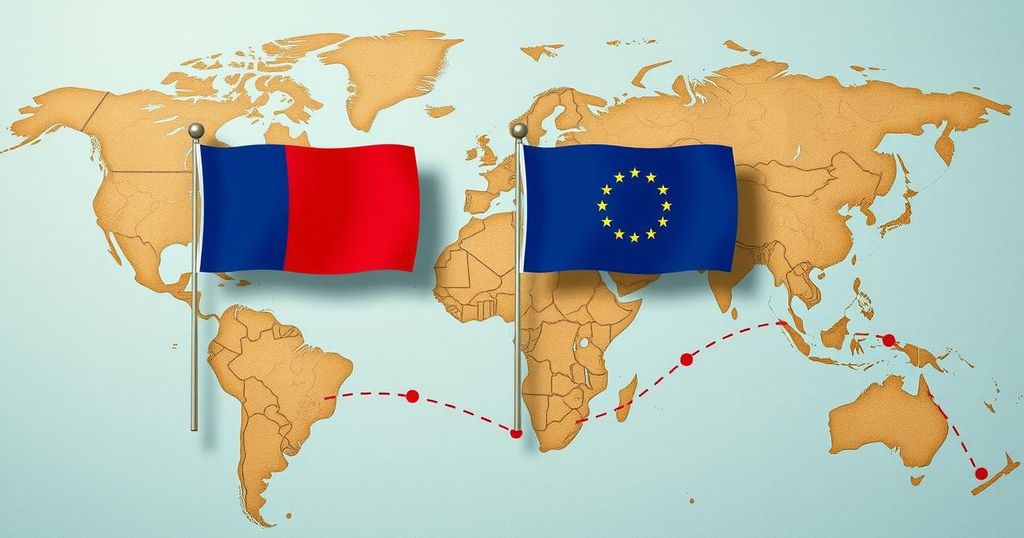Conflicts
ABBAS ARAGHCHI, ABDULLAH II, ASIA, ASSAD, BASHA, BASHAR ASSAD, BEIRUT, CONFLICT, DRONE STRIKES, GAZA, GAZA STRIP, HAMAS, HAYAT TAHRIR AL - SHAM, HEZBOLLAH, IRAN, JORDAN, LEBANON, MILITARY OPERATIONS, MOAT, MOHAMMED BIN ZAYED AL NAHYAN, PHILIPPINES, SHEIKH MOHAMMED BIN ZAYED AL NAHYAN, SYRIAN OBSERVATORY FOR HUMAN RIGHTS, TEHRAN, UNITED ARAB EMIRATES, WAR
Dante Raeburn
Syria’s Renewed Conflict: Military Counterattacks Amidst Insurgents’ Gains
The Syrian military is counterattacking insurgents who have taken Aleppo, with Iranian support amid escalating violence. Key battles in the region, particularly in Hama and Idlib, threaten stability at a time when Israel faces conflict in Gaza and Lebanon. The situation highlights Assad’s precarious position as insurgents make substantial territorial advances, raising concerns about regional security and humanitarian conditions.
The Syrian military has deployed reinforcements and initiated airstrikes in the northwest to repulse insurgents who have captured Aleppo, the nation’s largest city. Iran, a close ally of President Bashar Assad, has committed to supporting Syria amid this unexpected offensive that commenced recently. Insurgents, led by Hayat Tahrir al-Sham, have launched a dual attack on Aleppo and the surrounding countryside.
On Sunday, government forces established a robust defense line in northern Hama to contain the insurgents’ advance. Airstrikes targeted both Idlib and Aleppo, leaving at least 15 individuals dead, according to opposition-affiliated monitoring groups. The escalating violence carries the potential to destabilize the region further, coinciding with ongoing conflicts involving Israel, Hamas, and Hezbollah.
The insurgency’s offensive, coinciding with a ceasefire in Israel and Lebanon, presents a significant setback for Assad, particularly as his allies grapple with their own challenges. Iranian Foreign Minister Abbas Araghchi expressed Iran’s readiness to aid Syria, as several Arab leaders have publicly supported Assad amidst the crisis. Insurgents have made substantial territorial gains, including control over Aleppo’s water supply.
Reports indicate that opposition forces have overtaken additional areas, including the city of Hama. While many Syrians evacuated Aleppo amid fears of escalating conflict, life in the capital remains relatively stable. Insurgents have called on Syrian Kurdish forces to withdraw from Aleppo, despite political differences and ongoing tensions between their respective allies.
The U.N. special envoy has warned that the rebel advance poses risks to regional security and advocates for renewed diplomatic efforts. The U.S. is monitoring the situation closely amid concerns regarding the insurgents, designated as terrorists. Despite acknowledging the strain on Assad’s government, U.S. officials emphasize vigilance regarding the insurgents’ intentions.
Syrian state reports claim that government forces have repelled insurgents in Hama and engaged in significant air operations against insurgent strongholds. Allegations suggest that the Syrian military inflicted heavy casualties on the opposition, although these claims lack independent verification. Civilian casualties have also been reported in airstrikes across Idlib and Aleppo, indicating the ongoing humanitarian crisis in the conflict.
The battle for Aleppo represents a crucial juncture in the Syrian civil war, having determined the trajectory of control between government forces and opposition fighters since 2011. Retaining control over this strategic area has been essential for Assad, who has faced persistent challenges from both domestic opposition and external adversaries.
The ongoing civil war in Syria began in 2011, prompted by protests against President Bashar Assad’s regime. Over the years, the conflict has morphed into a complex struggle involving various insurgent groups, foreign interventions, and shifting alliances. Iran has emerged as a staunch ally of Assad, while the conflict has drawn in nations like Russia, Turkey, and the United States, each with their distinct interests in the region. The recent offensive by insurgents, particularly in Aleppo, underscores the war’s unpredictable and volatile nature, risking wider regional instability as various factions vie for power and territory.
The current situation in Syria remains precarious as insurgent forces advance, capturing significant territories and challenging the Assad regime. With Iran pledging support and regional stakeholders emphasizing the need for diplomatic resolutions, the dynamics of the conflict continue to evolve. The humanitarian toll exacerbates, as airstrikes inflict civilian casualties amidst this renewed violence. The future of Syria’s civil war depends on the interplay of local and international strategies amidst the enduring struggles for control and influence.
Original Source: www.pbs.org








Post Comment